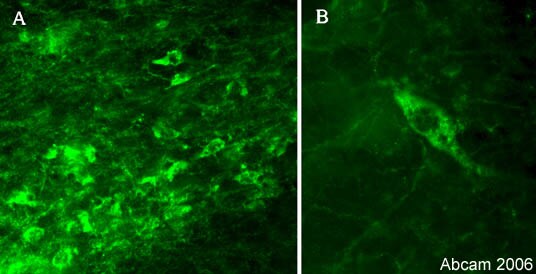Anti-Tyrosine Hydroxylase antibody (ab6211)
Key features and details
- Rabbit polyclonal to Tyrosine Hydroxylase
- Suitable for: IHC-FoFr, WB, ICC/IF, IHC-Fr
- Reacts with: Mouse, Rat
- Isotype: IgG
Overview
-
Product name
Anti-Tyrosine Hydroxylase antibody
See all Tyrosine Hydroxylase primary antibodies -
Description
Rabbit polyclonal to Tyrosine Hydroxylase -
Host species
Rabbit -
Specificity
Immunohistochemical distribution throughout the brain shows that staining is restricted to these neurons that are known to contain the enzyme. -
Tested Applications & Species
See all applications and species dataApplication Species ICC/IF RatIHC-FoFr RatIHC-Fr MouseWB Rat -
Immunogen
Synthetic peptide corresponding to Rat Tyrosine Hydroxylase aa 1-100 conjugated to keyhole limpet haemocyanin (Glutaraldehyde).
Database link: P04177 -
General notes
This antibody has proven useful in staining catecholaminergic neurons. It is a high quality reagent that stains these neurons intensely, including dendritic processes and fine nerve terminals.
The Life Science industry has been in the grips of a reproducibility crisis for a number of years. Abcam is leading the way in addressing the problem with our range of recombinant monoclonal antibodies and knockout edited cell lines for gold-standard validation.
One factor contributing to the crisis is the use of antibodies that are not suitable. This can lead to misleading results and the use of incorrect data informing project assumptions and direction. To help address this challenge, we have introduced an application and species grid on our primary antibody datasheets to make it easy to simplify identification of the right antibody for your needs.
Learn more here.
Properties
-
Form
Liquid -
Storage instructions
Shipped at 4°C. Store at +4°C short term (1-2 weeks). Upon delivery aliquot. Store at -20°C long term. Avoid freeze / thaw cycle. -
Storage buffer
pH: 7
Constituent: Whole serum -
 Concentration information loading...
Concentration information loading... -
Purity
Whole antiserum -
Primary antibody notes
This antibody has proven useful in staining catecholaminergic neurons. It is a high quality reagent that stains these neurons intensely, including dendritic processes and fine nerve terminals. -
Clonality
Polyclonal -
Isotype
IgG -
Research areas
Images
-
 Immunohistochemistry (PFA perfusion fixed frozen sections) - Anti-Tyrosine Hydroxylase antibody (ab6211) This image is courtesy of Sophie Pezet, Univ London Kings Coll, United Kingdom
Immunohistochemistry (PFA perfusion fixed frozen sections) - Anti-Tyrosine Hydroxylase antibody (ab6211) This image is courtesy of Sophie Pezet, Univ London Kings Coll, United KingdomTyrosine hydroxylase antibody (ab6211) staining rat mesencephalic serotoninergic neurons. Pictures taken using objectives X20 (A) or X20 (B). Note that the staining is observed in the cell body and the processes of these neurons. ab6211 was used at 1/1000 incubated for 2 days at room temperature. Secondary antibody was anti-rabbit Alexa Fluor 488 used at 1/1000 for 2 hours at room temperature. Rat brain tissue (ab29475) was perfusion fixed (paraformaldehyde 4% ) followed by post-fixation overnight in the same fixative, cryoprotected in 20% sucrose and then frozen in OCT. 30µm coronal sections of brain were cutting by cyrostat and immunohistochemistry was performed as the 'free floating' technique.
-
ab6211 staining tyrosine hydroxylase in PC-12 cells treated with orexin A (ab120212), by ICC/IF. Decrease in expression of tyrosine hydroxylase correlates with increased concentration of orexin A, as described in literature.
The cells were incubated at 37°C for 1h in media containing different concentrations of ab120212 (orexin A) in DMSO, fixed with 4% formaldehyde for 10 minutes at room temperature and blocked with PBS containing 10% goat serum (ab7481), 0.3 M glycine, 1% BSA and 0.1% tween for 2h at room temperature. Staining of the treated cells with ab6211 (1/1000 dilution) was performed overnight at 4°C in PBS containing 1% BSA and 0.1% tween. A DyLight 488 goat anti-rabbit polyclonal antibody (ab96899) at 1/250 dilution was used as the secondary antibody. Nuclei were counterstained with DAPI and are shown in blue. -
Anti-Tyrosine Hydroxylase antibody (ab6211) at 1/100 dilution + PC12 cell lysates at 6 µg
Performed under reducing conditions.
Predicted band size: 42,53,84 kDaThree bands are detected at ≈ 42 kDa, 53 kDa and 84 kDa.
-
 Immunohistochemistry (Frozen sections) - Anti-Tyrosine Hydroxylase antibody (ab6211) Image courtesy of QBM Cell Sciences, Ottawa, Canadaab6211 Rabbit polyclonal to Tyrosine Hydroxylase (1/1000) on cryopreserved ventral mesencephalic neurons dissected at mouse embryonic day 14. Neurons were thawed, plated and grown for 14 days, before fixation and overnight staining with ab6211.
Immunohistochemistry (Frozen sections) - Anti-Tyrosine Hydroxylase antibody (ab6211) Image courtesy of QBM Cell Sciences, Ottawa, Canadaab6211 Rabbit polyclonal to Tyrosine Hydroxylase (1/1000) on cryopreserved ventral mesencephalic neurons dissected at mouse embryonic day 14. Neurons were thawed, plated and grown for 14 days, before fixation and overnight staining with ab6211. -
 Immunohistochemistry (PFA perfusion fixed frozen sections) - Anti-Tyrosine Hydroxylase antibody (ab6211)
Immunohistochemistry (PFA perfusion fixed frozen sections) - Anti-Tyrosine Hydroxylase antibody (ab6211)Immunohistochemical detection of dopaminergic neurons in the rat zona incerta in a formalin-fixed floated cryostat section. Tyrosine hydroxylase immunoreactivity was visualized with ab6211 (1:100,000), using the biotinylated secondary antibody-ABC method and nickel-diaminobenzidine chromogen. Photo courtesy of Dr. Erik Hrabovszky, Hungarian Academy of Sciences, Budapest, Hungary.















